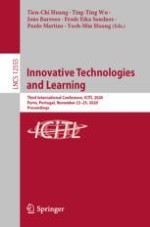2020 | OriginalPaper | Chapter
The Development of Simulation Web-Based Learning Environment to Enhance Ill-Structured Problem Solving for Engineering Students
Authors : Thawach Thammabut, Sumalee Chaijaroen, Suchat Wattanachai
Published in: Innovative Technologies and Learning
Publisher: Springer International Publishing
Activate our intelligent search to find suitable subject content or patents.
Select sections of text to find matching patents with Artificial Intelligence. powered by
Select sections of text to find additional relevant content using AI-assisted search. powered by
